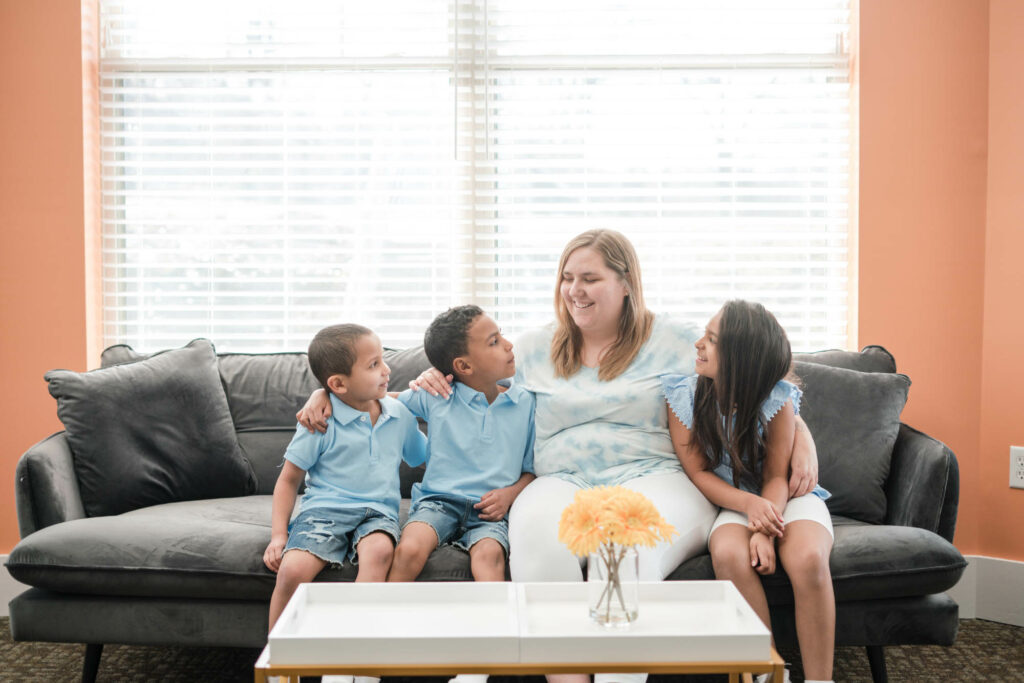The impact of COVID-19 on a local non-profit dedicated to serving women and children who are victims of domestic violence.
What is HEARTH?
Founded in 1989 by community supporters who saw the dire need for affordable housing, HEARTH became a fast-growing non-profit in the North Hills of Pittsburgh. The organization’s mission is to provide supportive services and housing that empower homeless women with children who are survivors of domestic violence or other trauma, to become independent, self-sufficient, and adequately housed. Their main goal is to eradicate homelessness, but they also provide the supportive services and housing needed for women with children to succeed on their journey to economic mobility. In May 2013, HEARTH moved into their new home in Shaler Township, where they can now serve up to 20 families in two- and three-bedroom apartments (transitional and permanent affordable housing) in a suburban setting.
“New normals” are a must at HEARTH.
2020 was not an easy year for anyone or any business. Everything and everyone was affected by the disruption, anxiety, and “new normals” that resulted from the global pandemic. However, HEARTH is no stranger to helping families navigate “a new normal” – it’s what they do day in and day out. Families have been coming to HEARTH for decades to build their new beginnings and find support in a liberated “new normal.” In fact, 2020 was HEARTH’s 25th anniversary. It was not the year of celebration they had hoped and planned for—instead—families’ anxieties, needs, and stresses were magnified by the pandemic. To add a little more “new” to the routine, HEARTH also welcomed new Chief Executive Officer, Marisa Williams.
Williams came to HEARTH with a strong heart and experienced resume. Even though the world was mid-pandemic, she was ready to lead and push HEARTH forward for the sake of every family they serve. “People first, projects second” has been Williams’s guiding motto as she stepped on board. She explains that listening and understanding the needs of the families should always come first and guide the projects that follow. This approach would serve HEARTH well throughout the pandemic.
How did HEARTH make it through 2020?
Just as small businesses qualified for Paycheck Protection Program (PPP) loans, non-profits were also able to apply for the support they needed to keep their bills paid. However, what really benefited HEARTH throughout 2020, was their aptitude to master the art of optimizing every dollar, volunteer hour, and opportunity to ensure resources were maximized for those they serve. Many families were counting on HEARTH to adapt and push forward—and they did so with their usual creativity and innovation.
Jessica Monahan, HEARTH’s Development Director, comments that the board of directors and employees began their emergency COVID-19 planning by “focusing on immediate family needs such as health, food, and security.” With an on-site food pantry and supply “store,” HEARTH was able to provide families with ample food and hygiene products to weather the initial quarantine restrictions. Their comprehensive security technology continued to ensure safety for mothers and children as they trained and schooled virtually.
And then the donations started to come in. Basic need supplies, monetary donations, and volunteers started appearing day by day. HEARTH also maintained an up-to-date Amazon.com® wish list and Target™ registry so families could request specific items (think backpacks, bedding, etc.). Those lists were very handy for donors in 2020 and continue to support HEARTH today. Yet, Monahan wasn’t shocked to witness neighbors stopping by to lend a hand. She explains, “HEARTH was built on community support—and survived the pandemic thanks to the same community support.” It was a nice reminder, 25 years later, of their grass roots project that came from the love of helping neighbors in need.
What did HEARTH learn in 2020?
“If there is anything that was reinforced in 2020, it’s that people are inherently GOOD,” reflects Williams. There are countless people willing to help their neighbors, even when the pandemic created uncertainty for us all. Monahan added that 2020 “was a year of great reflection for HEARTH” and will continue to make them and the families they serve stronger as they build their “new normal.”
What was the largest challenge for HEARTH families in 2020?
Mental health. Just imagine, a mother and her children have already lived through the trauma of escaping domestic abuse. They left with little to their name and no support system. They were scared, anxious, and worried about their future. Enter a pandemic. Politics. Social unrest. Their anxieties and uncertainties were only magnified by the events of 2020. More than supplies—HEARTH mothers and children needed peace, direction, and care for their mental health as they worked to rebuild their lives amid double the trauma, change, and chaos.
“We tried to provide moms with a sense of normalcy where we could,” explains Williams. “Volunteers and staff provided activity kits for children, social distanced support groups for moms, and continued to provide one-on-one career counseling for each and every mother.” Monahan further explains that although certain services (i.e. mental health) were prioritized differently amid the pandemic, HEARTH has always worked with families to individually meet their needs. “That’s what makes us unique,” explains Monahan, “We help moms and children by assessing individual needs and make a plan from there.” Again, reinforcing Williams’s motto, “People first, projects second.”
“We try to remind mothers that they cannot pour from an empty cup,” says Williams. “They need to learn to prioritize themselves, physically and mentally, and set a positive example for their children. Mom’s wholeness, mental wellness, physical well-being, and financial endurance has a multigenerational impact when it comes to ending the cycle of homelessness.” HEARTH makes it a priority to provide mothers with resources for total care so they may rebuild their lives and gain the confidence to move on and lead successful, independent lives.
What is 2021 looking like for HEARTH?
With their experience of 2020 leading the way, and more ample time to plan for 2021, HEARTH is excited for the future and continues to innovate how they support the mothers and children in their care. “We have a new energy in 2021, even with COVID in tow, and look to reimagine what HEARTH’s program can look like. We are trying to reinvent how we do what we do and make sure the women are better for it,” explains Williams optimistically.
The Standard Charitable Foundation was honored to award a $10,000 grant to HEARTH this past Spring. The grant will help HEARTH offset utility bills, security, and building maintenance for their facility in Shaler Township. The facility hosts 20 apartments that are refreshed for each family because “a safe place matters; that is a baseline to helping families move forward,” says Monahan. The apartments are the first step to a new life for the women and children that come to HEARTH.
How can your business support HEARTH?
Donations and volunteer hours keep HEARTH’s families supported and moving forward to end their homelessness; however, the real beginning for single mothers is finding the job that grants them true independence. “Single moms were hardest hit with unemployment during the pandemic. The greatest thing any business can give to one of our moms is the opportunity to start fresh with a new job,” explains Williams. “Workforce development is key for the families at HEARTH. That’s what makes me excited about Pittsburgh—the work has always been about the people. The business community can eliminate one of the greatest barriers to our moms achieving economic mobility. This is the best way an organization can help end homelessness in our area.”
If your business can help offer a job, career development, volunteer hours, monetary donations, or physical donations, please call HEARTH’s Development Director, Jessica Monahan, at (412) 522-0493 or by email at
jlmonahan@hearth-bp.org.
If you are interested in board service and are skilled in legal, mental health, operations, or diversity, equity and inclusion; please email HEARTH’s CEO, Marisa Williams at mcwilliams@hearth-bp.org.
Also, if you know an employee or someone in need to HEARTH’s support, please have them contact HEARTH at (412) 366-9801. Calls are confidential and someone will help you with your next step.
TAKEN FROM :: https://www.standardbankpa.com/hearth-creating-new-normals-for-new-normals/

